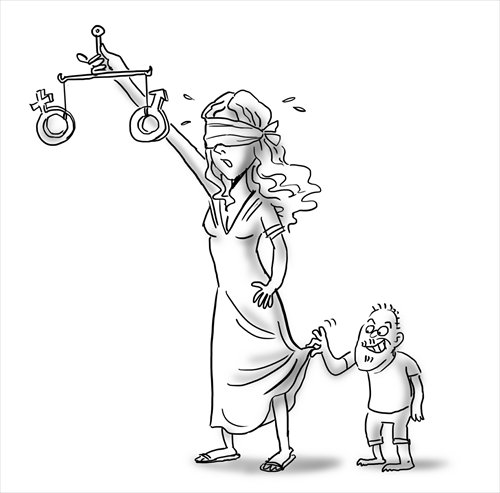HOME >> OP-ED
India still hasn’t confronted its gender issues years after Delhi gang rape
By Xie Chao Source:Global Times Published: 2015-12-28 0:43:01

Illustration: Liu Rui/GT
An old crime, the 2012 Delhi gang rape case, has once again brought public attention to the problems and status of women in India. Back then, the whole country was shocked and the world stirred by the brutality of the rape and the fatal assault on the victims.One of the accused died in jail before the court could rule that the other four adult defendants be sentenced to death. The juvenile convict received a sentence of three years' imprisonment, the maximum possible under Indian law.
He was released on December 20 after completing his full sentence behind bars. Compared to the nature of the crime he has committed, three years in custody was too short a time to quell the public anger.
Some legal changes took place to meet public calls for more sever punishment for gender-related crimes and a fast-track court system was institutionalized, with six new courts created to hear rape cases.
With more public conversation on rape and sexual violence, statistics also show that there is an increasing tendency for the women victims of gender crimes to report their cases.
But small steps cannot change the social mind-set alone.
In Delhi, there have been 1,813 reported rapes in 2014, compared to 1,441 in 2013.
Over 100 women are raped every day in India and this does not include marital rapes, which are legal in India, and those that went unreported.
A number of similar violent sexual assaults, with some even more brutal than the 2012 case, have been in the headlines recently.
People still remember that in the aftermath of the 2012 case, some government officials and politicians were suggesting that the girl had perhaps "asked for it" by going out at night.
A culture that blames women for attacks on them might not be unique to India, but the situation in India is especially hostile to women.
Remarks made by Manohar Lal Khattar, chief minister of Haryana in 2014 were sadly typical, "If a girl is dressed decently, a boy will not look at her in the wrong way. Freedom has to be limited. These short clothes are Western influences. Our country's tradition asks girls to dress decently."
Women are now braver about reporting assaults, but the police continue to be indifferent. Critics accuse them of registering more cases not out of a sense of duty but the fear of censure. In some of the worst cases, the victims might be abused by the cops themselves.
In cases that finally make it to court, victims face hostile lawyers, and sometimes judges, who challenge their testimony based on ancient gender prejudices.
It is unfortunate that even an event that caused global shock waves like the 2012 Delhi gang rape failed to trigger broader social revolution. To some extent, we can blame this on the contradictory impulses of caste, religion, gender, and class.
For instance, while Hindu and Muslim groups work toward communal coexistence, the latter might be reluctant to commit on gender equality; social forces such as the caste system find people standing for different propositions on religious violence and class gaps.
In major feminist groups, the Brahmin women might see their causes as different from those from low castes, and even among the latter, rich and poor women find different focal points in the cause, one for equal treatment and the other for more economic independence.
More government efforts are needed, but a reluctant government is seemingly more concerned about national honor than personal honor of women. In March 2015, a British-made documentary, India's Daughter tried to stir national consciousness on women's issues, but the government banned it in India, blaming it for bringing shame on the national image.
True honor comes only when a country displays the political will to fight a war to wipe out gender inequality and its brutality.
The author is a PhD candidate at the Department of International Relations, Tsinghua University. opinion@globaltimes.com.cn
Posted in: Viewpoint